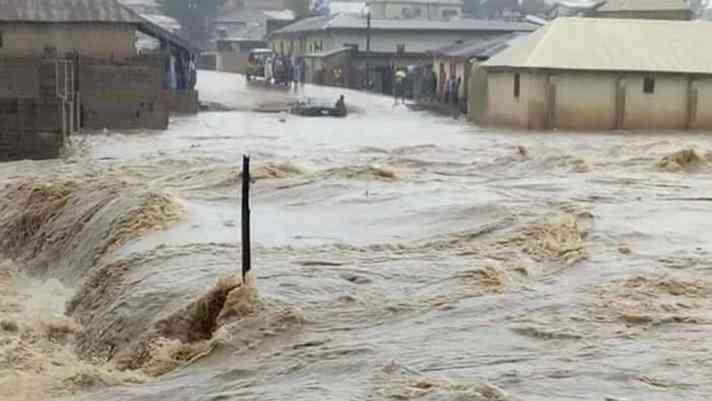
At least 76 people have been reported dead after a boat accident in Nigeria's south-eastern state of Anambra.
The boat, which was carrying at least 80 people, capsized on Friday in the Ogbaru area in Anambra state.
Most of the victims were women and children, trying to reach safety after their community had been inundated by floodwater.
Benard Achonu told the BBC he was devastated: "My life has fallen apart," he said.
The 60-year-old lost his wife and all three of his children, aged between two and six. They were among those fleeing floodwaters in the area, he said.
Another former resident, Precious Umeh, told BBC Pidgin that the situation was extremely bad. "Some people whose family members have died in the boat accident are wondering how to bury the bodies because there is no dry land in their area."
President Muhammadu Buhari offered his condolences to the families of the victims in the "tragic" accident.
He also ordered a review of safety measures across the country's water transport system, and said emergency services must do everything to account for those missing.
- Chamisa under fire over US$120K donation
- Mavhunga puts DeMbare into Chibuku quarterfinals
- Pension funds bet on Cabora Bassa oilfields
- Councils defy govt fire tender directive
Keep Reading
Mr Buhari called on government agencies "to check the safety protocols on these transport ferries to make sure such incidents are avoided in the future".
Local media reports say those aboard the boat were heading to the Nkwo market in Ogbakuba before it capsized. Some officials said the boat had suffered an engine failure and hit a bridge before capsizing.
Thickman Tanimu, south-east coordinator of the National Emergency Management Agency, told the AFP news agency: "The water level is very high and too risky for a smooth search and rescue operation".
Anambra governor Charles Soludo added that the accident had been a shock for both residents and the state's government, offering his sympathies to the victim's families.
Boat accidents are relatively common in Nigeria, although most are blamed on overloading or poor safety measures.







